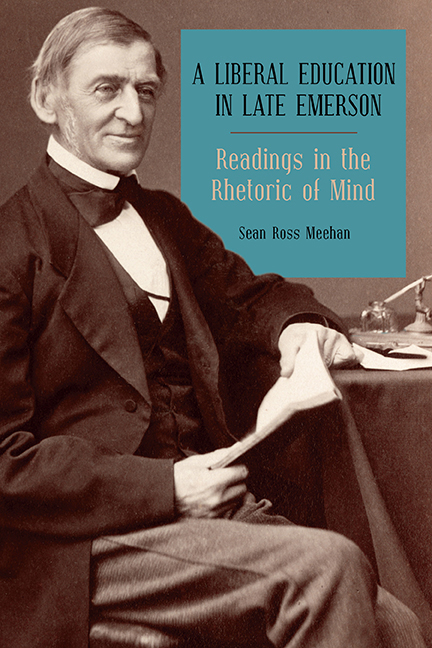Book contents
- Frontmatter
- Dedication
- Epigraph
- Contents
- Acknowledgments
- Introduction: Late Emerson and the Recomposition of Liberal Education
- 1 “Natural Method of Mental Philosophy”: William James's Principles of Pedagogy
- 2 “Education”: Charles W. Eliot's Invention of the University
- 3 “Poetry and Imagination”: Rhetorical Exercises in Walt Whitman's Gymnasium
- 4 “Eloquence”: Lessons in Emerson's Rhetoric of Metonymy
- Conclusion: Du Bois and the Double Consciousness of the College
- Notes
- Bibliography
- Index
3 - “Poetry and Imagination”: Rhetorical Exercises in Walt Whitman's Gymnasium
Published online by Cambridge University Press: 13 April 2019
- Frontmatter
- Dedication
- Epigraph
- Contents
- Acknowledgments
- Introduction: Late Emerson and the Recomposition of Liberal Education
- 1 “Natural Method of Mental Philosophy”: William James's Principles of Pedagogy
- 2 “Education”: Charles W. Eliot's Invention of the University
- 3 “Poetry and Imagination”: Rhetorical Exercises in Walt Whitman's Gymnasium
- 4 “Eloquence”: Lessons in Emerson's Rhetoric of Metonymy
- Conclusion: Du Bois and the Double Consciousness of the College
- Notes
- Bibliography
- Index
Summary
“Emerson-on-the-Brain”
WALT WHITMAN was surely Emerson's most inspired pupil. This is another way of saying that Whitman rejected Emerson as his teacher in the strongest of terms. We learn this from Whitman himself, writing in “Emerson's Books (The Shadows of Them),” a remembrance originally published in the May 1880 Boston Literary World and reprinted in “Notes Left Over” in Specimen Days and Collect two years later, shortly after Emerson's death. Whitman there reminds his reader that “years ago … like most youngsters” he had “a touch (though it came late, and was only on the surface) of Emerson-on-the-brain—that I read his writings reverently, and address'd him in print as ‘Master.’” But this was just a “stage of exercise” that “most young people of eager minds pass through,” we are to understand, since Whitman precedes this admission of former reverence for Emerson's thought with the vigorous rebuke that now, reading him years later, “[c]old and bloodless intellectuality dominates him.” These opposing forces of instruction and rejection move Whitman to this remarkable conclusion: “The best part of Emersonianism is, it breeds the giant that destroys itself.”
What exercise of mind and memory is Whitman passing through in thus critiquing late Emerson and the shadows of his books? To use the later American vernacular Whitman might have anticipated with his title, why is Whitman throwing Emerson shade? While Whitman biographer Jerome Loving has called Whitman's criticism of Emerson “grossly and unconscionably unfair,” Lawrence Buell reads a more appropriate—if also aggressive—exercise in the sort of “anti-mentorship” that the master taught. Whitman here practices, in other words, what Buell calls Emerson's theory of “readerly Self-Reliance,” exercising Emerson's influence as itself a figure of agonistic relation between older teachings and new, independent learning. There are further complexities to this agon of Whitman's “Emersonianism” that I want to explore in this chapter. These complexities are suggested in the figures of embodiment, and in particular, the figures of physiology and digestion that Whitman employs in this remembrance to reject the provisions of his brainy teacher and to declare his brawny independence.
- Type
- Chapter
- Information
- A Liberal Education in Late EmersonReadings in the Rhetoric of Mind, pp. 68 - 92Publisher: Boydell & BrewerPrint publication year: 2019



